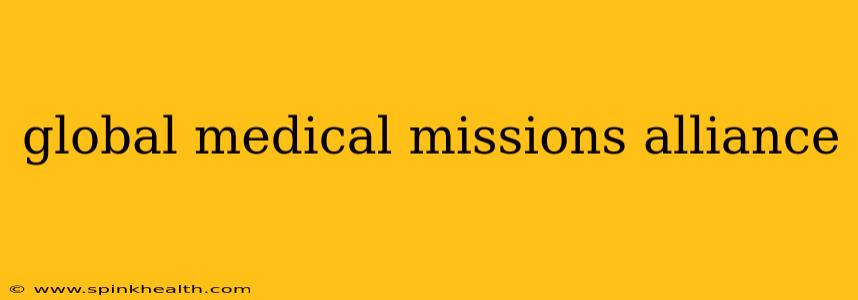The world is a tapestry woven with threads of diverse cultures, landscapes, and needs. And sometimes, those needs are most acutely felt in the realm of healthcare. In the face of limited resources, inadequate infrastructure, and widespread disease, a quiet army of compassionate individuals rises to the challenge: the global medical missions alliance. This isn't just a collection of organizations; it's a vibrant network of hope, a testament to humanity's unwavering commitment to healing. Let's delve into the heart of this remarkable movement and explore its profound impact.
What is a Global Medical Missions Alliance?
A global medical missions alliance isn't a singular entity with a single office and CEO. Instead, think of it as a vast, interconnected web of non-profit organizations, faith-based groups, and individual volunteers united by a shared purpose: delivering essential medical care to underserved populations worldwide. These alliances often collaborate, pooling resources, expertise, and manpower to maximize their impact. They work tirelessly in remote villages, impoverished urban communities, and disaster-stricken areas, providing critical services that might otherwise be unavailable.
How do Global Medical Missions Alliances Work?
The work of a global medical missions alliance is multifaceted and requires a delicate balance of planning, logistics, and compassionate care. Typically, these alliances follow a multi-stage process:
- Needs Assessment: Identifying communities with the greatest medical needs, analyzing the prevalent health issues, and understanding the local context.
- Resource Mobilization: Securing funding, medical supplies, equipment, and volunteer personnel – doctors, nurses, dentists, pharmacists, and support staff.
- Mission Deployment: Traveling to the designated area, establishing temporary clinics or collaborating with existing healthcare facilities.
- Medical Services: Providing a range of services, including preventative care, treatment of acute illnesses, surgical procedures, dental care, and health education.
- Post-Mission Follow-up: Ensuring the sustainability of healthcare initiatives by training local medical personnel and establishing ongoing support systems.
What types of medical care do Global Medical Missions Alliances provide?
The specific services offered vary depending on the needs of the community and the expertise of the volunteers. However, common offerings include:
- Primary Care: Addressing common ailments such as infections, respiratory problems, and gastrointestinal issues.
- Surgical Interventions: Performing essential surgeries, often focusing on trauma care, obstetrics, and ophthalmology.
- Dental Care: Providing dental examinations, cleanings, extractions, and basic restorative work.
- Preventative Healthcare: Implementing vaccination programs, promoting hygiene practices, and educating communities about disease prevention.
- Maternal and Child Health: Focusing on prenatal care, safe delivery services, postnatal care, and child immunization.
What are the challenges faced by Global Medical Missions Alliances?
While the work is deeply rewarding, global medical missions alliances face numerous challenges:
- Funding limitations: Securing sufficient funding to support large-scale operations and sustain long-term initiatives.
- Logistical hurdles: Navigating complex travel arrangements, securing necessary permits, and managing the transportation of medical supplies and equipment.
- Cultural sensitivity: Understanding and respecting the cultural norms and beliefs of the communities they serve to ensure effective communication and acceptance.
- Language barriers: Overcoming communication challenges through translation services or multilingual volunteers.
- Safety and security concerns: Addressing potential risks related to political instability, disease outbreaks, and natural disasters.
How can I get involved with a Global Medical Missions Alliance?
Contributing to the cause of global medical missions can be fulfilling in many ways. You can:
- Donate: Financial contributions are crucial to support the operational costs of these organizations.
- Volunteer: Offering medical expertise or logistical support as a volunteer can make a significant difference.
- Advocate: Raising awareness about the critical need for global health initiatives within your community.
- Gather Supplies: Collecting and donating essential medical supplies and equipment.
The global medical missions alliance is a beacon of hope, a testament to the power of collaborative effort and the human spirit's capacity for compassion. By supporting this vital work, we can contribute to building a healthier, more equitable world for all.

